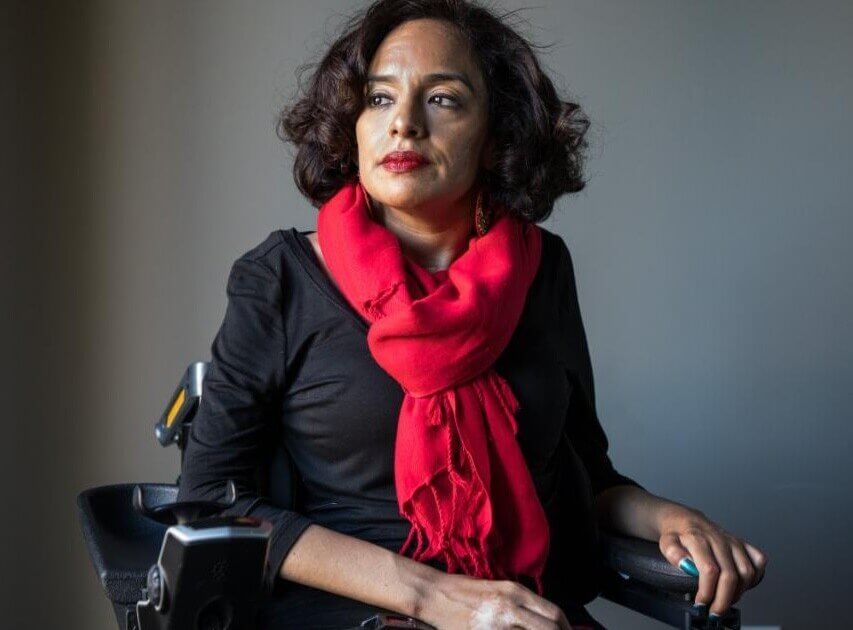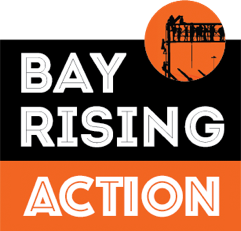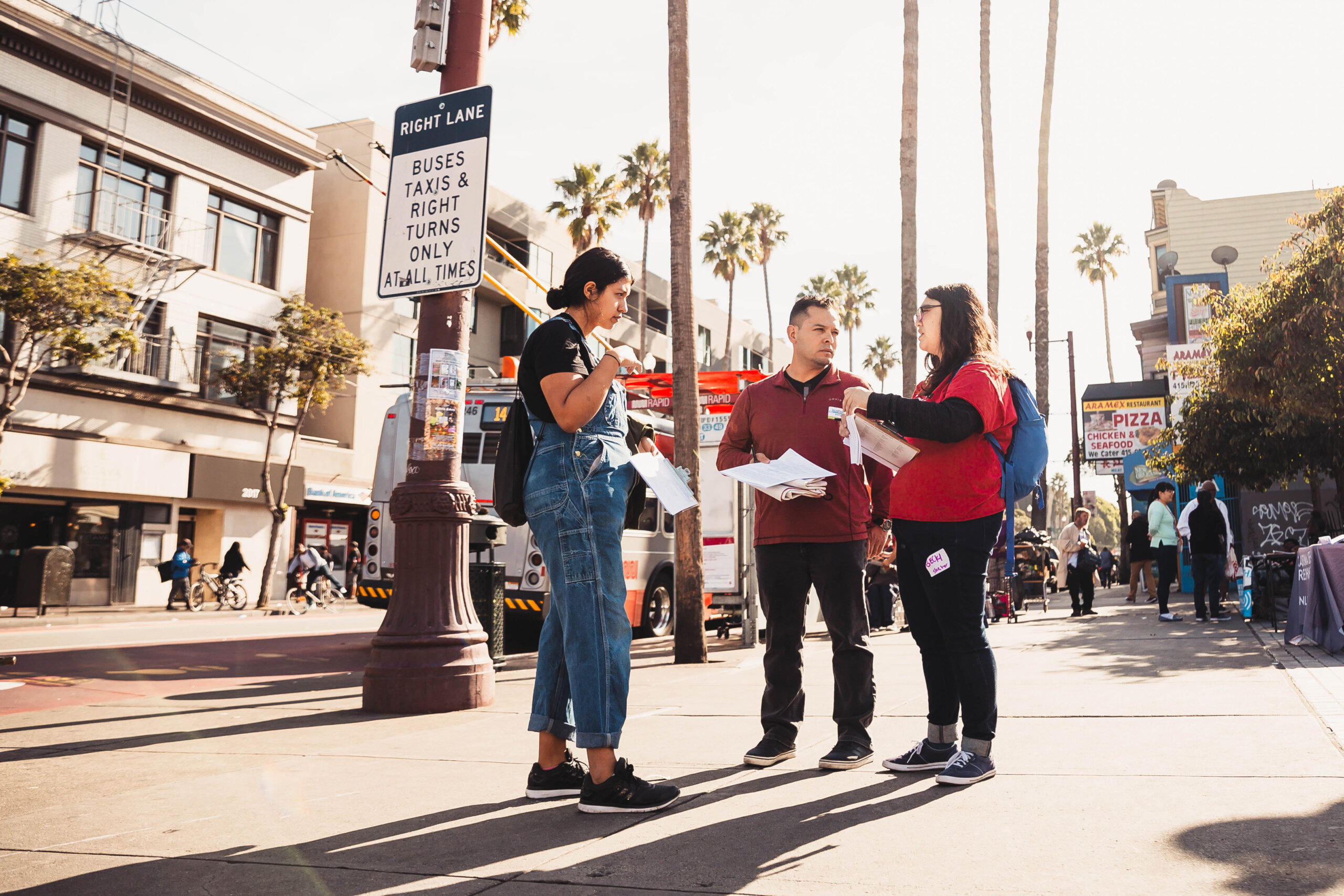
Part 1: “I care not just about inclusion, but about changing the systems for people of color and their families”: An Interview with San Mateo Union High School District Board of Trustees, Ligia Andrade Zúñiga
In March 2023, we interviewed San Mateo Union High School District Board of Trustees, Ligia Andrade Zúñiga for Women’s History Month. Vice President Zúñiga is a longtime community activist and a champion for education. She makes sure students have an equal voice to communicate their experiences and their needs, including those who are invisible, underserved, and underrepresented.
Here are some of her thoughts from her running for office to making sure that our schools, political arenas, and our communities are accessible to everyone.
Claire Donovan-Suguitan for Bay Rising Action: Thank you for taking the time to speak with Bay Rising Action today. So tell us: what office do you hold, and why did you decide to run for office?
Ligia Andrade Zúñiga: I’m the Vice President of the San Mateo Union High School District Board of Trustees. My parents are from Guatemala and I was born and raised here in the States, but I identify as Latina/e/x. There has never been a Latina woman on the school board. I also have a disability. I have a spinal cord injury, so I’m paralyzed from the chest down and I use a power chair. I really wanted to encourage other people who are from underrepresented communities or live in intersections that people don’t usually talk about, by showing them that they can totally serve in elected positions.
My master’s degree is in public administration. I really like governance, policy, and legislation. I believe it’s really important to have leadership reflect different communities and bring in different perspectives. And in my opinion, the most effective way of creating change is through influencing policy and leveraging relationships.
Last thing: my kids went through the school district that I’m on the board for, so I also saw a lot of things that I felt needed advocacy and change. Then the opportunity presented itself, and I took it.
BRA: That’s amazing. What would you say are two topics that needed that advocacy or change, or some of the themes that propelled you?
LAZ: One is special education reform. We need to change that. And two, the different prison pipelines: the special education to prison pipeline, the immigration to prison pipeline, and the school to prison pipeline. Those issues really resonate with me. I care not just about inclusion, but about changing the systems for people of color and their families. Part of it is that I saw that the board didn’t reflect the student body or the community. So I thought it was important to have representation.
BRA: Most definitely. This month for Women’s History Month, we want to celebrate progressive women in office. What was your experience running for office? Are there learnings that you would want other women to know?
LAZ: Well, I had a really good experience. It was really exhausting, but it was fun and I met a lot of really great people. I think that was probably one of the best things about running: meeting people and talking with young people. My campaign team was very diverse. I had a lot of young folks on my campaign team, and that was cool.
I was very fortunate, and maybe people don’t see it this way, but I was fortunate because I campaigned during COVID. I say that because I have a disability and not everything is accessible to me. We live in a very ableist world. Implicit bias is very real and I experience it every day with my power chair. With being virtual during COVID, people saw me first, not the chair, and they didn’t judge me on that point. They may have judged me on what I said or what I looked like, but they didn’t include the judgment that people have about having a disability. And so I was able to be in all kinds of spaces and talk to all kinds of people.
But on the flip side, maybe it would’ve been good for them to see my chair because then they could see that, yeah, people with disabilities run for office too, you know? It really helped people that couldn’t leave their homes or couldn’t do certain things that able-bodied people or non-disabled people can do. So it kind of leveled the playing field for everybody.
BRA: Yeah, I can definitely agree with that. I was a senior in college when COVID started and we started to have these conversations around accessibility. We need to make it more accessible for everyone to participate in society.
LAZ: Yes, exactly. It’s forced us to think differently. And as you said with students, I serve on different commissions and boards, and we’ve gotten so much more participation because people are remote. People have childcare issues, transportation issues, students are in school, and people have to work. Some commission meetings are in the middle of the day. So where’s the representation then? How can we get the community’s participation when the meeting is not accessible to them? The problem is that now, as of March 1st, the state of emergency is lifted. So a lot of meetings are going back to in-person, which is creating barriers to participation. It’s frustrating.
BRA: For sure. What were some of the challenges that you had during your campaign or that you’ve faced while in office?
LAZ: Some barriers that I experienced could have been people’s biases, but what I really want to highlight is the financial aspect of running for office. It’s ridiculous. I mean, some people spend millions and I’m like, okay, we have all of this money to run election campaigns, but we don’t donate money to nonprofits and schools. You know, there is money out there, but people just don’t want to spend it in certain ways. So that didn’t sit well with me.
I spent about $30,000-$40,000 [on my campaign]. On mailers alone, I spent something outrageous, like $20,000-$30,000. I can’t really remember, but it was a lot. And I’m thinking, wow, what a waste. That’s such a waste of paper. It’s a waste of time. I just felt it was so wasteful. I still have many things left over, including materials like buttons, and I’m thinking, what am I gonna do with all this? You know, because they say 2020 instead of something I can use in the future if I do decide to run for reelection.
I am very lucky that I was involved in a lot of boards and commissions before, and that I’ve worked in the schools in terms of volunteering with my kids. I knew a lot of people and so that really helped me. But if I didn’t, would I have had the same outcome? I was also very fortunate to know two people who really pushed my campaign forward.
Even putting in the candidate statement cost me $2,200 and that’s just insane, you know? They did refund around $600 of that amount because there were three of us running, and the cost gets lower as more people decide to run. But it’s just like, why? What a waste. Not everybody even reads the candidate statements or the ballot guide not everybody has access to the right meetings and information about the election process.
That’s the other thing: accessibility to the information we need to be able to vote. Even with the need for good internet connections during the shutdown, people lacked broadband, especially in remote and rural areas. That prevents people from voting because it prevents them from knowing about candidates and voting for the ones that they feel identify with them in those communities. I think there needs to be more education for people to really understand all the propositions and all the candidates. Some people don’t understand them, so they don’t vote.
This interview has been edited for length and clarity. [link to part 2]





